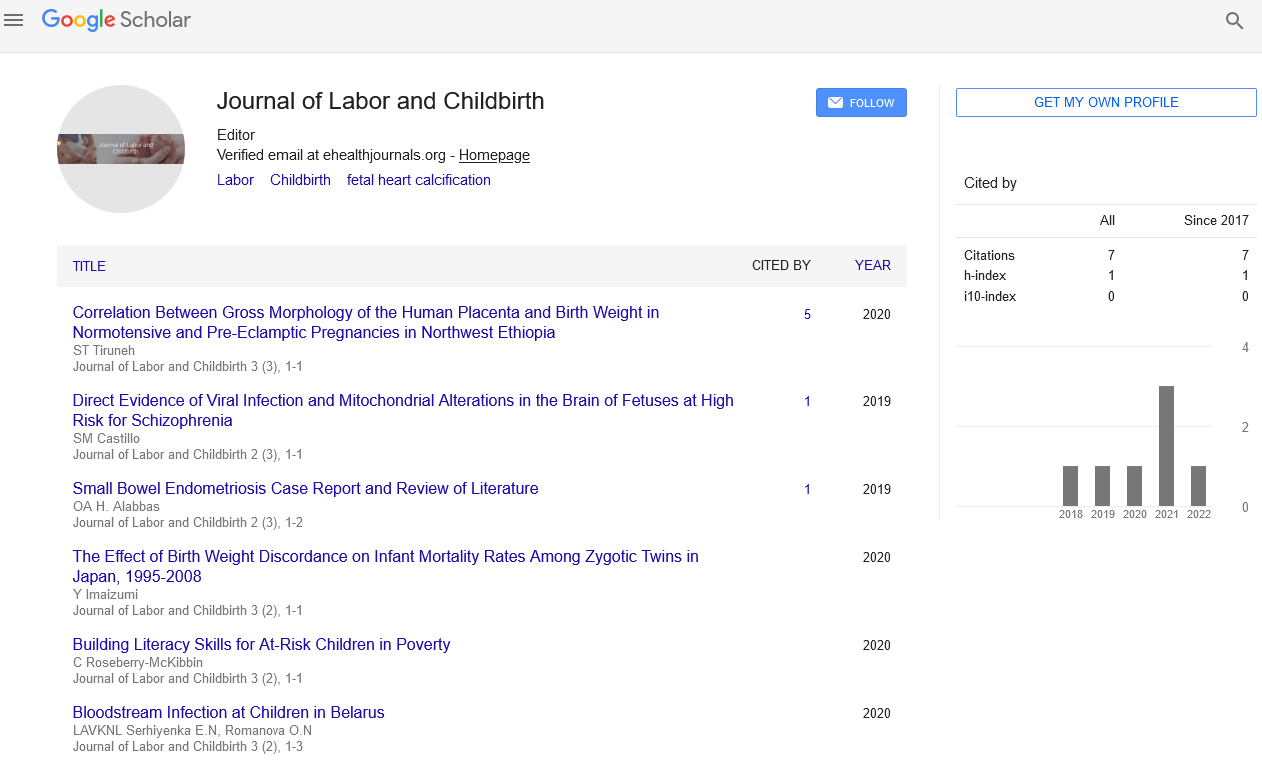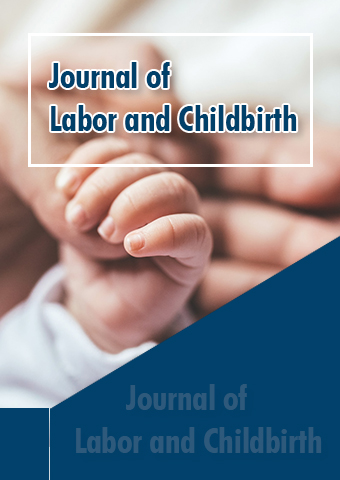Review Article - Journal of Labor and Childbirth (2023) Volume 6, Issue 1
A controlled, randomized study of the effects of music intervention on the mother's anxiety and stress during a caesarean section
Caroline Julie*
Department of Biological sience,University of Southhampton , United Kingdom
Department of Biological sience,University of Southhampton , United Kingdom
E-mail: caroline@edu.in
Received: 09-Feb-2023, Manuscript No. jlcb-23-93074; Editor assigned: 10-Feb-2023, PreQC No. jlcb-23- 93074 (PQ); Reviewed: 24-Feb-2023, QC No. jlcb-23-93074; Revised: 27- Feb-2023, Manuscript No. jlcb-23- 93074(R); Published: 28-Feb-2023; DOI: 10.37532/jlcb.2023.6(2).020-022
Abstract
Background: During pregnancy and childbirth, stress and anxiety have negative effects on both the mother and the baby. Music may have a beneficial effect in this circumstance, as evidenced by the circumstances. The present study looks into how the mother’s anxiety and stress are affected by music during the caesarean section. Methods: 304 patients are included in the single-center, controlled, and randomized SAMBA study. Through loudspeakers, the women in the intervention group heard music from one of four self-selected genres. Music was not used in the standard treatment for the control group. Regional anesthesia was used during the caesarean section. Different subjective (State-Trait Anxiety Inventory, visual analogue scale for anxiety) and objective parameters (salivary cortisol/amylase, heart rate, blood pressure) parameters were collected at admission, during the skin incision, during the skin suture, and two hours after the surgery was finished. Data were analyzed using independent sample t-tests and mixed-factorial variance analysis. Conclusions: The expectant mother can reduce her stress and anxiety by listening to music during her caesarean section.
Keywords
Caesarean • Anxiety • Stress • Music intervention
Background
In Germany, nearly one in three women has a caesarean section. As a result, it is one of the most common operations and the most common abdominal surgery. Although the circumstances almost always bring joy, they are also feared and are linked to a significant amount of stress for the patient. Studies have shown that maternal stress has negative effects on the fetus and later psychological development. In addition, it is known that increased levels of stress and anxiety can have a negative impact on postoperative pain perception, the use of analgesics, and the lactation of new mothers. The need for alternative, low-risk methods to positively impact anxiety and stress arises due to the limited pharmacological options available to pregnant women. One of the oldest treatments for anxiety and stress is based on the positive effects of music. Music may have a positive effect on non-validated questionnaires and heart rate and heart rate variability as a surrogate for stress and anxiety in two randomized studies examining the influence of music during the pre-operative waiting period. Six hours after Caesar’s death, this effect could partially still be observed. Only one randomized study was able to demonstrate a positive effect of music intervention on heart rate at the end of the caesarean in 64 participants, according to a Cochrane analysis investigating the effect of music during the procedure. The study’s design made it impossible to draw any further inferences regarding anxiety’s subjective and objective perception. Another study looked into how music affected postoperative pain during caesarean delivery under general anesthesia and found no effect. The study’s design made it impossible to draw any further inferences regarding anxiety’s subjective and objective perception. Another study looked into how music affected postoperative pain after a caesarean section under general anesthesia but found no effect [1].
Methods of Study
The Sectio Caesarea and the Effect of Music Begleit therapy on Anxiety; English: The Caesarean and the effect of music intervention on anxiety) study is a randomized, controlled, single-center trial that was carried out at the University Hospital Dusseldorf in Germany.
Ethics followed
The Medical Department’s ethics committee at Heinrich-Heine-University in Düsseldorf approved the study protocol (No.: 3625), registered in the German clinical trials registry (DRKS00007840) and with the World Health Organization (Universal Trial Number U1111– 1173-3204) in accordance with the Declaration of Helsinki. The study protocol can be obtained via email from the corresponding author upon reasonable inquiry. Before participating, each eligible patient signed an informed written consent form [2].
Participants
The pregnant women, who understood enough German and had an indication for a primary caesarean in regional anesthesia, were under the condition of such kind of study. In addition, the patients were included only if the physician determined that there were no serious comorbidities, no significantly increased surgical risk (such as placental disturbances), and no serious condition of the fetus was known. In addition, the study only included patients without any serious mental alterations or generalized anxiety disorder [3, 4].
Outcomes
The STAI-trait was completed by the participating women when they attended the routine surgical preparation appointment seven to fourteen days prior to the caesarean. During the routine cardiotocogram, the VAS-A, the STAI-state, and the first saliva sample were taken at admission on the day of the scheduled caesarean. In either group, there was no prescribed preoperative medication. After surgery, the Hepp et al. At the skin incisions and sutures, blood pressure and heart rate were recorded. A second saliva sample was taken during the skin suture, and the patient completed the VAS-A and the STAI-state questionnaire. A third saliva sample was taken at the conclusion of post-operative monitoring two hours after the skin suture. In addition, the participant provided a third response to both the VAS-A and the STAI-state questionnaire [5].
Discussion
In general, the study demonstrates, in both subjective and objective dimensions, that listening to music during a caesarean section lessens anxiety and stress.
Although the subjective anxiety drop in both STAI-state and VAS-A was significantly higher in the music group and resulted in significantly lower anxiety scores compared to the control group at admission, despite the fact that neither group significantly differed from the other at admission, both groups had high baseline values for STAI-state and VAS-A. Previous research investigating the effect of music on caesarean and other medical procedures is consistent with the positive effect of music on these subjective measures of anxiety and stress. As a result, the measurement at the skin suture accounts for a significant portion of the objective stress sensation experienced during the procedure. As a result, the current result demonstrates that the music group also subjectively experiences lower levels of stress during the Caesarean period. Studies in other fields of medicine may also demonstrate that music has a lowering effect on cortisol [6, 7].
Salivary amylase did not exhibit a similar effect. The activity of the hypothalamic-pituitaryadrenocortical axis is represented by cortisol, while the sympathetic nerve system is activated by salivary amylase. In accordance with previous research on stress during surgery, there is no discernible difference in salivary amylase between the groups in our study. This could be a sign that there are unidentified factors that prevent accurate interpretation of the salivary amylase during surgery [8].
The effect of music on the cardiovascular system has been the subject of numerous studies. It is debated whether the interaction of the external musical rhythm with the internal body rhythms of heart and respiration rate as a primary carrier of the effect of music is a primary carrier in addition to having a direct effect on the dopaminergic mesolimbic reward center . As a result, the value of systolic blood pressure and heart rate as objective indicators of stress and anxiety is well documented. The music group’s heart rate and systolic blood pressure levels at the skin incision were significantly lower in this study [9].
The high level of patient acceptance of the intervention should also be noted, in addition to the positive impact that music had on the patients’ measured levels of stress and anxiety.
Regardless of any therapeutic effects, 96 percent of women in the intervention group would want to hear music again during a possible repeated caesarean. The women’s positive response to the music intervention alone is encouraging and should encourage the use of music in obstetrics and additional research in this field [10].
Conclusion
The present study ought to have implications for clinical practice in light of the findings. Therefore, it would be ideal if women who deliver via caesarean section could regularly have access to music. In any case, further examination ought to consider the effect of music in the careful group. Despite the fact that prior research only demonstrated negative effects for large volumes and complex interventions this has not been explicitly investigated in the context of caesarean sections. In conclusion, the present study demonstrates that listening to music during a caesarean section calms the wake patient’s anxiety and stress. As a result, incorporating it into clinical practice seems prudent.
References
- Hepp P, Hagenbeck C, Gilles J et al. Effects of music intervention during caesarean delivery on anxiety and stress of the mother a controlled, randomised study. BMC Pregnancy Childbirth. 18, 435 (2018).
- Hepp P, Hagenbeck C, Burghardt B. Measuring the course of anxiety in women giving birth by caesarean section: a prospective study. BMC Pregnancy Childbirth.16,113 (2016).
- Mulder EJH, Roblesde Medina PG, Huizink AC et al. Prenatal maternal stress: effects on pregnancy and the (unborn) child. Early Hum Dev. 70, 3-14 (2002).
- O Donnell KJ, Glover V, Barker ED et al. The persisting effect of maternal mood in pregnancy on childhood psychopathology. Dev Psychopathol. 26, 393- 403 (2014).
- Good M Effects of relaxation and music on postoperative pain: a review. J Adv Nurs. 24, 905- 914 (1996).
- Laux L, Glanzmann P, Schaffner P et al. DasState-Trait-Angstinventar (STAI) (Beltz-Test). Beltz Test GmbH. 1981.
- Strahler J, Skoluda N, Kappert MB et al. Simultaneous measurement of salivary cortisol and alpha-amylase:application and recommendations. Neurosci Biobehav Rev. 83, 657- 677 (2017).
- Schoofs D, Wolf OT. Aresalivary gonadalsteroid concentrations influenced by acute psychosocial stress?A study using theTriersocialstresstest(TSST). Int J Psychophysiol. 80, 36- 43.9 (2011).
- Van Stegeren AH, Wolf OT, Kindt M. Salivary alpha amylase and cortisol responses to different stress tasks: impact of sex. Int J Psychophysiol. 69, 33- 40 (2008).
- Koelsch S. Brain correlates of music-evoked emotions. Nat Rev Neurosci. 15, 170- 80 (2014).
Indexed at, Google Scholar, Crossref
Indexed at, Google Scholar, Crossref
Indexed at, Google Scholar, Crossref
Indexed at, Google Scholar, Crossref
Indexed at, Google Scholar, Cross Ref
Indexed at, Google Scholar, Crossref
Indexed at, Google Scholar, Crossref
Indexed at, Google Scholar, Crossref

